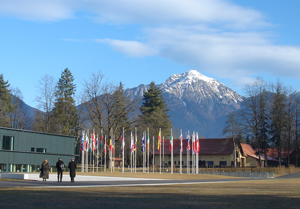Organisation Represents Cyprus at ICEM Conference 2009 in Abu Dhabi
Executive Director Gives a Keynote Address at e-Learning Expo 2009 in Athens
3 November 2009
CARDET, a non-profit research and development organization and regional leader in the drive for next generation education, innovation and social reform, today announced findings from its large scale survey of the use of Information Communication Technologies (ICT) by primary school teachers in the Republic of Cyprus, the first-ever survey of its kind.
The results of the survey are part of a project supported by the Cyprus Research Promotion Foundation, the Republic of Cyprus and the European Structural Funds. The project’s main goal is to develop a framework for ICT teacher professional development in Cyprus. The project commenced on 1 December 2008 and will conclude on 30 November 2011.
CARDET completed the survey in partnership with the Open University of Cyprus and INNOVADE L.I. LTD. The survey results are based on 12 months of in-depth work combining qualitative and quantitative methods. A validated instrument was provided to 1051 teachers, using stratified sampling procedures. The main objective of the survey was to analyze how teachers use technology in the classroom and what challenges they face.
In the recent years, there have been dramatic improvements in the availability of ICT infrastructure in public schools. However, the findings show that although ICT is available in most schools and classrooms throughout Cyprus, teachers use it mainly for preparing educational material and planning instruction. More than 64% of teachers indicated they use the internet almost daily for preparing educational material. Nevertheless, only 28.6% of the teachers and 12.9% of students use the Internet in the classroom on a daily basis.
According to teachers who participated in the survey, the most significant barriers to the integration of ICT are curriculum requirements and the amount of time required for the design and implementation of ICT-based educational activities. The results of the survey are in alignment with international studies conducted by CARDET and its partners in more than 20 countries.
“Our participation in this project represents a tremendous step forward for the Republic of Cyprus in the deployment of ICT in the nation’s classrooms”, said CARDET Executive Director Dr. Charalambos Vrasidas. “We have long been champions of this effort, and we were pleased to spearhead this portion of project. We expect our findings will play a role in future planning for integrating ICT in education and teacher professional development in Cyprus.”
CARDET presented its preliminary findings on 7 October 2009 at the International Council for Educational Media (ICEM) conference in Abu Dhabi. ICEM, an UNESCO affiliated organization, provides a channel for the international exchange and evaluation of educational media information, as well as a forum for organisations focused on the development and application of educational technology. Dr. Vrasidas is a member of the ICEM Executive Board.
Dr. Vrasidas also discussed the findings on 10 October 2009 during a keynote address at the e-Learning Expo 2009 in Athens, which was attended by more than 3000 people. The e-Learning Expo seeks to encourage and promote innovative technology-based approaches to education. The theme of this year’s expo was “Innovation and Creativity in e-Learning”
“With our roster of more than 30 projects, CARDET has become a major player in the region in the application of ICT for education and training”, concluded Dr. Vrasidas. “We are helping push the entire industry forward in the eastern Mediterranean”.
CARDET is currently developing programs which will be offered by CARDET Academy, in response to gaps identified in the field of ICT-related education. CARDET will announce further details about CARDET Academy (www.cardetacademy.eu) and about recently awarded projects prior to the end of the year.
About CARDET
Founded in Nicosia, Cyprus, in 2004 by an international team of education and technology experts, the Center for the Advancement of Research and Development in Educational Technology (CARDET) is a non-profit research and development organization with strategic partners worldwide. CARDET’s mission is to inspire innovation and promote education, research, and development through evidence-based practices, cutting-edge research, and empowered professionals. The organization provides evaluation, research, development and training services to governmental agencies, private organizations and NGOs. CARDET has successfully completed projects in more than 20 countries, in partnership with a number of private and public institutions, including EuropeAid, the Research Promotion Foundation, the European Commission, the United Nations Development Program, the International Council for Educational Media, the William and Flora Hewlett Foundation and Microsoft. For more information, please visit www.cardet.org.

 Charalambos represented CARDET and participated in the conference on “Challenges of EU27 development policy” on 18 February 2008 at Brdo, Slovenia. The Cyprus Ministry of Foreign Affairs, invited CARDET to participate in the event, since there was a provision for NGOs to be represented in this discussions. The conference provided the opportunity for an open discussion on the challenges the EU development policy is facing. Topics discussed included aid effectiveness, division of labor, funding mechanisms as well as children and women in armed conflicts with particular reference to EU development policy. An informal discussion on future organizational aspects of EU development policy took place during a working lunch.
Charalambos represented CARDET and participated in the conference on “Challenges of EU27 development policy” on 18 February 2008 at Brdo, Slovenia. The Cyprus Ministry of Foreign Affairs, invited CARDET to participate in the event, since there was a provision for NGOs to be represented in this discussions. The conference provided the opportunity for an open discussion on the challenges the EU development policy is facing. Topics discussed included aid effectiveness, division of labor, funding mechanisms as well as children and women in armed conflicts with particular reference to EU development policy. An informal discussion on future organizational aspects of EU development policy took place during a working lunch.